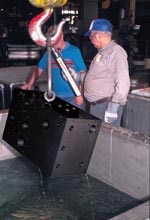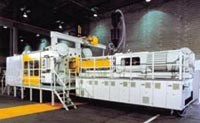In-House Blackening System Creates Faster Finishing Of Large Manifold And...
HPM Corporation (Mt. Gilead, Ohio) is a manufacturer of injection molding presses. These injection molding presses cover the full technology range, from toggle clamp injection molding machines to hydromechanical two platen presses.
Share




HPM Corporation (Mt. Gilead, Ohio) is a manufacturer of injection molding presses. These injection molding presses cover the full technology range, from toggle clamp injection molding machines to hydromechanical two platen presses. Sizes range from 60 to 5,000 tons. HPM designs and builds these machines with the goal of making every facet of design and production at the highest level of quality. These complex machines utilize hydraulic manifolds and other precision manufactured components that control the high pressures and temperatures encountered in the molding process.
The size of the manifolds ranges from about the size of a lunch box to that of a refrigerator. Part weight ranges from 20 to over 6,000 lbs. While the average size is about that of suitcase, all are high value components, precision ground for flatness and bored to tight tolerances. Because these are expensive, precision parts, they must be finished individually. Therein lay the problem.
HPM was using a paint process in which the parts were degreased in an agitated washer containing a corrosion inhibitor, then dried and sent to assembly. The hydraulic connections were made at this point, and a careful, final hand cleaning was performed. Remaining holes were plugged and those areas not meant to be painted were masked with tape. Black paint was sprayed on and the parts were allowed to dry. When removing the masking tape, technicians had to take extra care so that paint particles did not get into the manifold holes and contaminate the hydraulic fluid.
This finishing method provided adequate corrosion protection and presented an attractive appearance, but the paint’s 1 to 2 mil coating thickness created problems at times. Some areas on the manifolds, including the hydraulic connections, had to be kept free of paint, and masking them by hand was a slow, tedious process.
In addition, it is not unusual for an assembled manifold to undergo retrofitting in order to accommodate last minute design changes. If the assembly has already been painted, it requires stripping, reassembly and repainting, which is time consuming and expensive.
HPM management decided to find a better finishing process, one that was faster, cleaner and more predictable. Charles Clark, engineering manager, directed the effort to identify finishing options and make recommendations.
“Paint wasn’t the answer,” says Mr. Clark, “because it was just too slow for our rapidly growing operation. We had to find a process that not only gave us the desired corrosion protection and appearance, but could also accommodate the rapidly expanding demand for these parts. Of paramount concern, of course, were operator safety and environmental compatibility.”
After consultations with Birchwood Casey, a supplier of metal finishing systems, Mr. Clark’s team decided the best method for its needs was the Presto Black process, a surface treatment utilizing room temperature blackening chemistry.
“We started small on a prototype scale,” reports Mr. Clark, “in order to evaluate the finish and determine its compatibility with hydraulic oil. We purchased a five-gallon test line to learn the process and measure it against established standards. We blackened a wide variety of small test parts and experimented with different process parameters, testing different rust preventative sealants. Birchwood Casey’s labs did a series of separate tests to determine finish compatibility with hydraulic oils, both mineral oil and glycol types.
“Out of this prototype testing came the optimum process and cycle. This gave us the confidence to go ahead with the installation of the production scale system.”
The Presto Black process itself produces a durable crystal structure on the surface of the manifold parts and produces several advantages over HPM’s painting process. The Presto Black process forms a chemical conversion finish, bonded to the steel, with no chipping, peeling or black ruboff. Finish thickness is a uniform 0.000040 inch on all surfaces, protecting both internal and external areas of the parts. Finishing was possible before assembly, thereby eliminating the time-consuming masking operations.
Additional advantages included the fact that the system employs a “closed filtration process.” No rinse waters or chemicals enter the drains when using the process. This is achieved through the use of Ion Exchange filtration that continually purifies the rinse waters and returns them to the process tanks for re-use.
Besides helping to maintain HPM’s clean drains, the new process requires no high temperature heating or complicated operating procedures.
HPM’s Presto Black system, which requires 15 to 20 minutes from start to finished part, includes cleaning, rinsing, surface preparation, rinsing, blackening, rinsing and sealing. This finishing system requires just five 800-gallon tanks configured closely together in two rows to minimize product movement and conserve floor space.
The three rinse operations are done in a single tank purified by ion exchange. All tanks are arranged so that parts can be moved from the chemical tanks to the common rinse tanks without dripping active chemical solutions into other tanks.
Measuring 66 inches H by 72 inches W by 54 inches D, the tanks are fabricated of stainless steel and are mounted in a pit in the floor that provides an effective tank height of 42 inches required by OSHA guidelines. Tank lids cover the chemical solutions when the line is not operated. MMS
Read Next
Setting Up the Building Blocks for a Digital Factory
Woodward Inc. spent over a year developing an API to connect machines to its digital factory. Caron Engineering’s MiConnect has cut most of this process while also granting the shop greater access to machine information.
Read MoreBuilding Out a Foundation for Student Machinists
Autodesk and Haas have teamed up to produce an introductory course for students that covers the basics of CAD, CAM and CNC while providing them with a portfolio part.
Read MoreRegistration Now Open for the Precision Machining Technology Show (PMTS) 2025
The precision machining industry’s premier event returns to Cleveland, OH, April 1-3.
Read More
























.png;maxWidth=300;quality=90)








